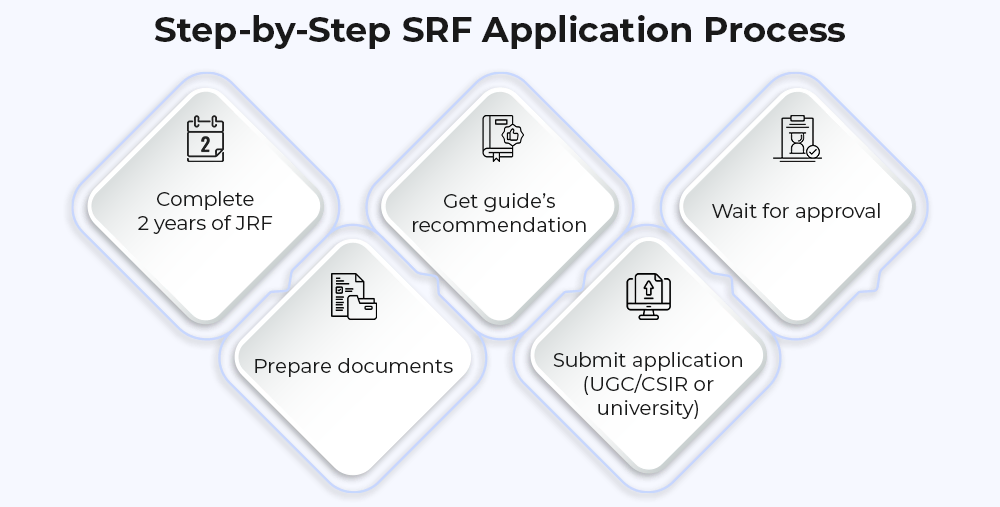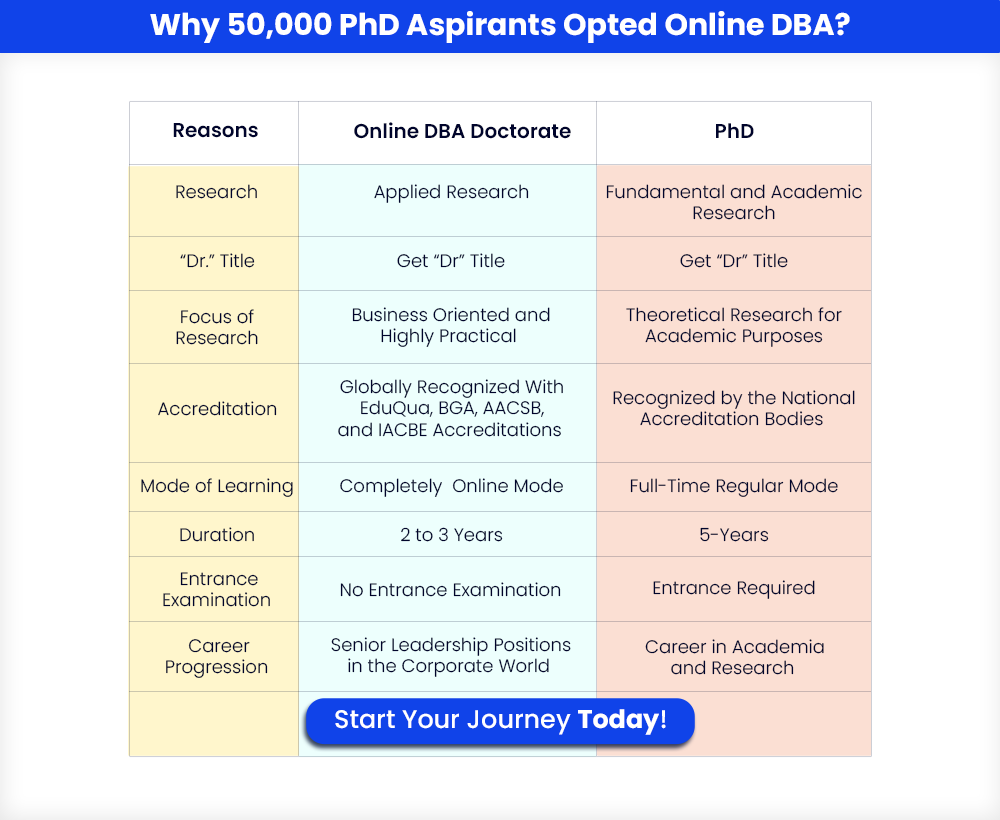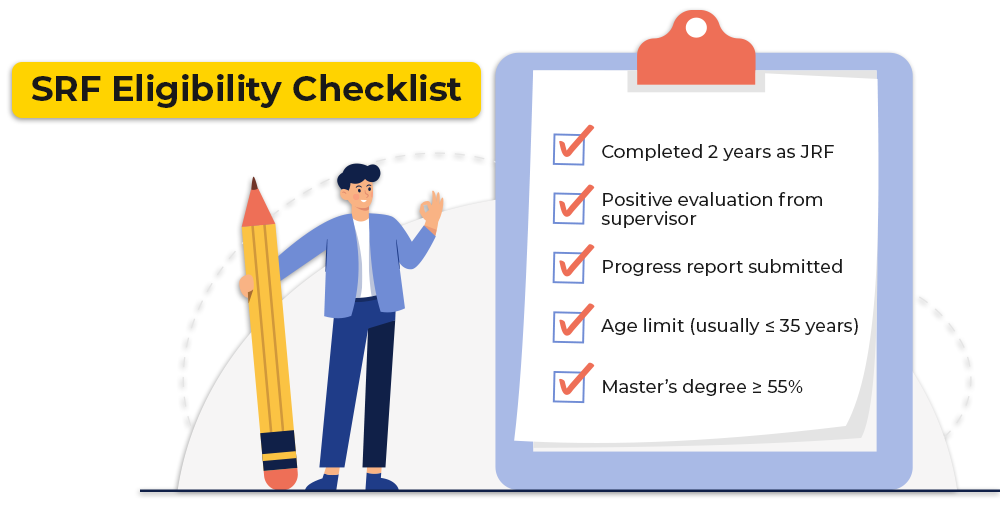Expert Interviews
- University Reviews
- Career Guide
 Video Counseling
Video CounselingImportant Facts
- Ask any Question - CV Forum

SRF (Senior Research Fellowship): A Guide for PhD Scholars
Kopal Srivastava Sep 12, 2025 1.2K Reads

If you're pursuing a PhD or planning to start one soon, you've probably come across terms like JRF (Junior Research Fellowship) and SRF (Senior Research Fellowship). These are important stages in a research scholar’s academic journey, especially in India. In this article, we’ll dive deep into what SRF means, who is eligible for it, how it differs from JRF, the benefits involved, and the responsibilities that come with it.
What is SRF (Senior Research Fellowship)?
SRF, or Senior Research Fellowship, is a funding opportunity granted to PhD scholars after they complete two years of their doctoral research under a Junior Research Fellowship (JRF). The purpose of SRF is to support promising researchers during the later stages of their research. It is typically granted from the third year of the PhD program and continues until the scholar completes their research (up to five years in total, including JRF).
This fellowship is usually offered by institutions like UGC, CSIR, ICMR, DST, and other research bodies in India, and it comes with an upgraded stipend compared to JRF.
Who Can Get an SRF?
To become eligible for an SRF, you must:
- Complete two years as a JRF (Junior Research Fellow) during your PhD.
- Have satisfactory performance and recommendations from your supervisor or research guide.
- Appear for an internal evaluation or presentation in front of a departmental research committee or review panel.
- Some institutions might require you to publish research papers or attend conferences before promoting you to SRF.
Once these conditions are met and your performance is deemed satisfactory, you will be promoted to SRF status and begin receiving the benefits associated with it.
JRF vs SRF: What’s the Difference?
|
Feature |
Junior Research Fellowship (JRF) |
Senior Research Fellowship (SRF) |
|
Duration |
First 2 years of PhD |
From 3rd year till the completion (max 5 yrs) |
|
Monthly Stipend |
Rs. 37,000 (as per UGC/CSIR norms) |
Rs. 42,000 (as per UGC/CSIR norms) |
|
Eligibility |
Qualifying UGC NET / CSIR NET |
Promotion after JRF + internal evaluation |
|
Focus |
Research training, literature review |
Independent research and thesis writing |
|
Responsibilities |
Assist in lab work, literature review |
Lead your research project independently |
SRF Benefits and Allowances
One of the major reasons why scholars look forward to becoming SRFs is the financial support and academic credibility it brings. Here are the key benefits:
Higher Stipend
You get a monthly fellowship of around Rs. 42,000 (as per government norms), which is a hike from the Rs. 37,000 you receive under JRF. This helps in managing your personal expenses and academic costs better.
HRA (House Rent Allowance)
If hostel accommodation is not provided by your university, you may be eligible for HRA, depending on the city and the fellowship provider’s guidelines.
Contingency Grant
Scholars often receive an annual contingency grant of Rs. 20,000 to Rs. 25,000 for expenses related to research, such as buying books, software, research tools, or attending conferences.
Medical Benefits
Some institutions also provide limited medical facilities or reimbursements during your fellowship tenure.
How to Apply for SRF (Senior Research Fellowship) for PhD
The Senior Research Fellowship (SRF) is a financial support given to PhD students after they complete two years of research as Junior Research Fellows (JRF). It helps students continue their research work in the third year and beyond. If you are already enrolled in a PhD program and have completed two years of research, you can apply for SRF. Here’s a simple step-by-step guide on how to apply.

1) Complete Your JRF Period
Before applying for SRF, you must complete two years of research under JRF (Junior Research Fellowship). During this time, you will be closely monitored and your progress will be recorded by your guide or supervisor.
2) Check Eligibility
You can apply for SRF if:
- You have completed two years of PhD research as a JRF.
- Your PhD progress is satisfactory, and your research supervisor recommends you.
- You have submitted two years' progress reports signed by your guide.
- You have a Master’s degree with at least 55% marks.
- You should also be within the age limit set by the fellowship provider (usually up to 35 years).
3) Prepare Required Documents
Before applying, make sure you have the following:
- A copy of your PhD registration letter.
- Two years of research progress reports.
- A recommendation letter from your PhD supervisor.
- Your CV or biodata.
- Your marksheets and degree certificates.
- Any published research papers (if you have).
- Your JRF award letter or details.
- Passport-size photograph and identity proof.
4) Application Process
Here’s how to apply:
If You Are Funded by UGC/CSIR
If your JRF was awarded by UGC or CSIR:
- Visit the official UGC/CSIR website.
- Download the SRF extension form.
- Fill out the form and attach the required documents.
- Get the form signed by your PhD guide and the head of your institution.
- Submit it to the CSIR/UGC office through your institute.
If Your University Offers SRF
Some universities or research institutes offer their own SRF scheme. You must:
- Visit your university’s research office or website.
- Fill in the internal SRF application form.
- Submit all the required documents and progress reports.
- Wait for approval from the research committee.
Selection Process
Once you submit your application:
- Your research work will be reviewed by an expert committee.
- If approved, your JRF will be upgraded to SRF.
- You will start receiving an increased stipend (Rs 42,000 per month).
Final Tips
- Always talk to your PhD guide before applying.
- Make sure your research reports are detailed and honest.
- Keep an eye on deadlines if your institute has specific timelines.
- Maintain a good academic record and attitude toward research.
Role and Responsibilities of an SRF
As an SRF, you are expected to take on more independent responsibility for your research work. Here are the core expectations:
- Conduct original research aligned with your PhD topic.
- Publish research papers in reputed journals.
- Present your work in national and international conferences.
- Collaborate with other researchers or departments.
- Submit progress reports to the university or funding agency.
- Prepare your final thesis or dissertation.
Your work as an SRF adds significant value not only to your academic profile but also to the scientific or scholarly community.
How to Apply or Get Promoted to SRF?
There is no separate “exam” for SRF. It’s a promotion based on your performance as a JRF fellow. Here's how the process usually works:
- End of 2 Years as JRF: Your supervisor will evaluate your progress.
- Assessment Panel: You will be asked to give a presentation or submit a report.
- Promotion Approval: The university’s research committee or the fellowship-granting agency will approve your promotion.
- Official Intimation: Once approved, your status will change to SRF and your stipend will increase accordingly.
Note: If your performance as a JRF is not satisfactory, the committee can terminate the fellowship or extend JRF without promoting to SRF.
Skills You Develop During SRF
The SRF stage is a critical time in your PhD journey. You not only deepen your research knowledge but also develop professional skills such as:
- Academic writing
- Data analysis and tools (e.g., SPSS, R, Python)
- Time management
- Presentation and communication
- Leadership and mentoring juniors
These skills are extremely valuable whether you pursue academia, research jobs, postdocs, or industry roles after your PhD.
Career After SRF
Once you complete your PhD with SRF support, there are various options open to you:
- Postdoctoral Research: Apply for postdoc fellowships in India or abroad.
- Academia: Join as an Assistant Professor or Lecturer at universities.
- Research Jobs: Work in R&D departments of public or private companies.
- Government Positions: Apply for scientist roles in DRDO, ISRO, CSIR labs, ICMR, etc.
- Consultancy or Think Tanks: Become a domain expert in your field.
The credibility of having been an SRF adds academic weight to your resume and increases your employability.
Documents Required for SRF Continuation/Promotion
Here’s a list of common documents required while applying for SRF promotion:
- Progress Report (for 2 years as JRF)
- NOC from supervisor
- Presentation or Research Abstract
- Copies of published papers (if any)
- Recommendation Letter
- University/Institutional endorsement
Why SRF Matters
SRF is not merely a stipend increase—it's an acknowledgment of your research potential. It is a shift from being a research assistant to being an independent scholar. It involves its own responsibilities, expectations, and benefits.
If you are planning your PhD life, make sure you realize this transition and accordingly plan. Be consistent, collaborate with your guide intensively, publish regularly, and demonstrate your progress. Your journey from JRF to SRF is a decisive phase that defines your academic and professional life.
Bonus Tip: Check Online DBA Options
If you are a professional in employment or cannot dedicate yourself to full-time PhD studies, opt for a Doctor of Business Administration (DBA) course. Most prestigious organizations provide Online DBA courses that are flexible, internationally accredited, and need not involve relocation. Although different from conventional SRF/JRF-funded PhDs, they provide similar academic intensity and leadership worth in the business community.
Why an Online DBA instead of a PhD?
If you're thinking about doing a doctoral degree in business, you might wonder: Should I go for a PhD or an Online DBA?
Let’s make this simple.
A PhD in Business is mostly for those who want to teach in universities or do academic research.
But a Doctor of Business Administration (DBA) is different. It’s for people already working in the business world, managers, consultants, CEOs who want to become smarter leaders, solve real-world problems, and grow professionally.
Here’s why an Online DBA can be a better choice for you.
-
Designed for Working Professionals
Let’s be honest, quitting your job for a full-time PhD is not always possible.
The Online DBA is made for people like you, working professionals who want to study without stopping their careers. You don’t need to sit in a classroom every day. You can study at your own pace, from your home or office, and apply what you learn right away at work.
-
Solve Real Business Problems
A PhD often focuses on theory, models, and publishing research papers in academic journals. That’s great for those who want to become professors.
But in a DBA, you study real business problems things that happen in marketing, HR, finance, or operations. Your research can help solve issues in your company, or even help you start your own business.
-
Faster and More Flexible
A PhD can take 4–7 years, full-time. An Online DBA usually takes 2.5 to 4 years, and you get to plan your study schedule around your job.
You don’t have to wait to finish your degree to see the results. Most students start using their DBA knowledge in their job right away from better decision-making to leadership skills.
-
Boosts Your Career and Salary
Let’s face it, business is all about growth. A DBA is respected in the corporate world and tells others that you are an expert leader who understands business deeply.
Whether you want a promotion, a better role, or to become a consultant or entrepreneur, a DBA opens new doors.
-
Global Learning, No Borders
With an Online DBA, you can learn from top international universities without leaving your country. You get global exposure, learn from global case studies, and even network with students from different countries.
Many online DBA programs are offered by top business schools in the UK, USA, Europe, and the UAE. You can earn an international degree without spending a fortune on travel or accommodation.
-
Great ROI (Return on Investment)
An Online DBA is often cheaper than a full-time PhD. You continue earning while studying, so there's no loss of income. Plus, the skills and leadership mindset you gain can lead to higher positions and a better salary. You invest in yourself, and the returns last for a lifetime. If your dream is to become a professor or a full-time researcher, a PhD is a great option.
But if you’re a professional who wants to grow in your business career, lead better, solve real problems, and still keep your job, then an Online DBA is a smart, modern choice.It’s flexible, powerful, and built for the real world. So the question is no longer “Why DBA instead of PhD?”
The real question is: “Why not?”
Conclusion
Choosing between a PhD and an Online DBA depends on your career goals. A PhD is ideal for those wanting to enter academics and do theoretical research. But if you're a working professional aiming for leadership, practical business knowledge, and career growth, an Online DBA is a smarter and more flexible option. It allows you to study while working, solve real-world problems, and earn a respected global degree. Whether you want to boost your skills, get promoted, or make a bigger impact in business, an Online DBA helps you grow without pressing pause on your life or career.
FAQs (Frequently Asked Questions)
In a PhD program, SRF stands for Senior Research Fellowship. It's a fellowship awarded to a PhD candidate after they have successfully completed their Junior Research Fellowship (JRF) and demonstrated significant progress in their research. Essentially, it's the next stage in the fellowship timeline for PhD students who are progressing well in their research work.
Key aspects of SRF:
- Continuation of Support: SRF provides continued financial support and research opportunities for PhD scholars who have shown promise and made progress in their research.
- Increased Responsibility:As an SRF, researchers are often expected to take on more responsibility in their projects and contribute more significantly to the research.
- Higher Stipend: SRFs typically come with a higher stipend compared to JRFs, reflecting the increased experience and contribution expected from the researcher.
- Advancement from JRF: SRF is a promotion from JRF, meaning a researcher must first qualify for and hold a JRF before being considered for an SRF.
- Review Process: The transition from JRF to SRF often involves a review of the researcher's progress by a review committee.
- Different Funding Agencies:SRFs can be awarded by various funding agencies like UGC, CSIR, or others, each with their own eligibility criteria and guidelines.
The stipend for a Senior Research Fellow (SRF) in a PhD program is currently Rs. 42,000 per month. This is an increase from the previous amount of Rs. 35,000. The SRF position is typically for the later years of a PhD program, following the Junior Research Fellowship (JRF) period.
Here's a more detailed breakdown:
- JRF (Junior Research Fellow): Rs. 37,000 per month.
- SRF (Senior Research Fellow): Rs. 42,000 per month.
- Research Associate (RA): There are different levels of Research Associates with varying stipends, such as RA-I (Rs. 58,000), RA-II (Rs. 61,000), and RA-III (Rs. 67,000).
- Contingency: A separate contingency grant of Rs. 20,000 per annum is also provided.
- Duration: The SRF position generally lasts for 3 years after the initial 2 years as a JRF, potentially extending up to a maximum of 5 years, including the JRF period.
The stipend increase for both JRF and SRF positions is a recent revision effective from January 1, 2023.
SRFs are awarded by different government bodies, like:
- UGC (University Grants Commission)
- CSIR (Council of Scientific and Industrial Research)
- ICMR, DST, and others.
- Each has its own rules and process.
No, SRF (Senior Research Fellowship) is not the same as a PhD.
SRF is a financial support given to PhD students after they complete their first two years as a JRF (Junior Research Fellow). If their work is found to be good, they are promoted to SRF and get more money and responsibility from the third year of their PhD.
To become an SRF, a PhD student must complete two years as a JRF.
If the student’s research progress is good and they have published or submitted a good research paper during this time, they can be promoted to SRF.
The SRF status usually starts from the day the student completes 2 years as a JRF.
You must complete two years as a JRF. If you get a research paper accepted in a journal within those two years, you can be promoted to SRF. The SRF benefits start from the date you complete two years as a JRF.
Some of the highest PhD stipends in India are:
- Goa Institute of Management (GIM): Rs. 62,000/month + free stay
- IIIT-Delhi: Rs. 60,000/month
- DST-INSPIRE Fellowship: Rs. 60,000–Rs. 1,25,000/month (5 years)
- Prime Minister’s Fellowship: Rs. 70,000–Rs. 80,000/month + Rs. 2 lakh yearly grant
- ICMR/DBT Fellowships: Rs. 37,000–Rs. 42,000/month
Stipends depend on the university, program, and funding source.
The SRF is given for 2 years, but it can be extended to 5 years depending on your research progress.
- First 2 years (JRF): Rs. 31,000/month + HRA
- After 2 years (SRF): Rs. 35,000/month + HRA
- Plus, a contingency grant of Rs. 20,000 per year for research expenses.
JRF is considered higher than NET. Both are part of the UGC NET exam, but to get a JRF, you need to score 5%–7% more than the NET cut-off. Only the top 6% who clear NET get the JRF.
Yes, if you're doing a PhD, you need to move from JRF to SRF. After two years as a JRF, you must submit a progress report. If approved, you're upgraded to SRF and get a higher stipend.

10 Years of Experience / Storyteller / Research-driven Writer
Loves to create story and narrating them through a Podcast
Every query is essential.
Our team of experts, or experienced individuals, will answer it within 24 hours.
Recommended for you
Tired of dealing with call centers!
Get a professional advisor for Career!
LIFETIME FREE
Rs.1499(Exclusive offer for today)

Pooja
MBA 7 yrs exp

Sarthak
M.Com 4 yrs exp

Kapil Gupta
MCA 5 yrs exp
or



Career Finder
(Career Suitability Test)
Explore and Find out your Most Suitable Career Path. Get Started with our Career Finder Tool Now!
ROI Calculator
Find out the expected salary, costs, and ROI of your chosen online university with our free calculator.


